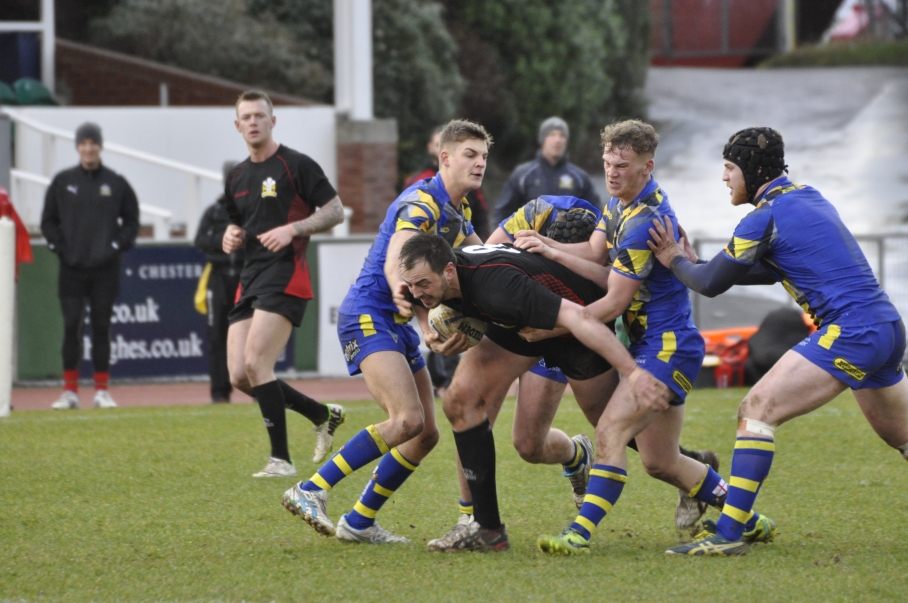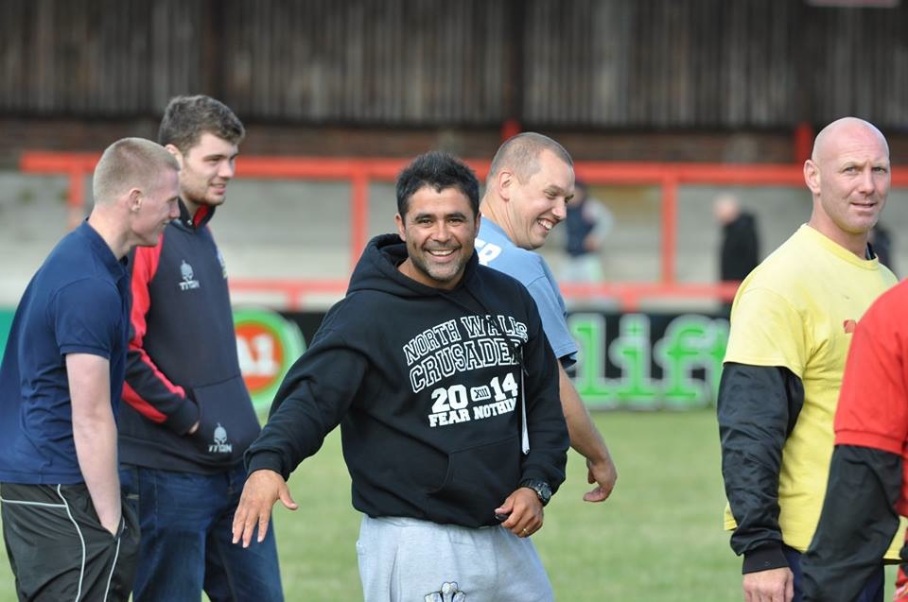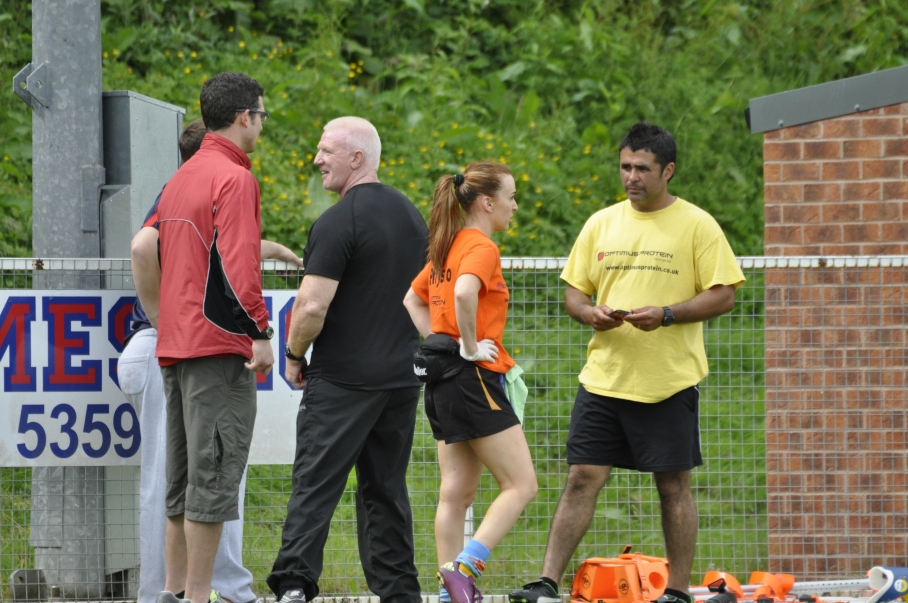Finally, rugby league is back; it feels like an age since Crusaders walked off the pitch after their final game of 2014 against Leigh Centurions.
After working hard in training over the last couple of months, Crusaders began their pre-season schedule last weekend with a 20-16 victory over their partner club Warrington Wolves’ U19s side at Eirias Parc, Colwyn Bay.
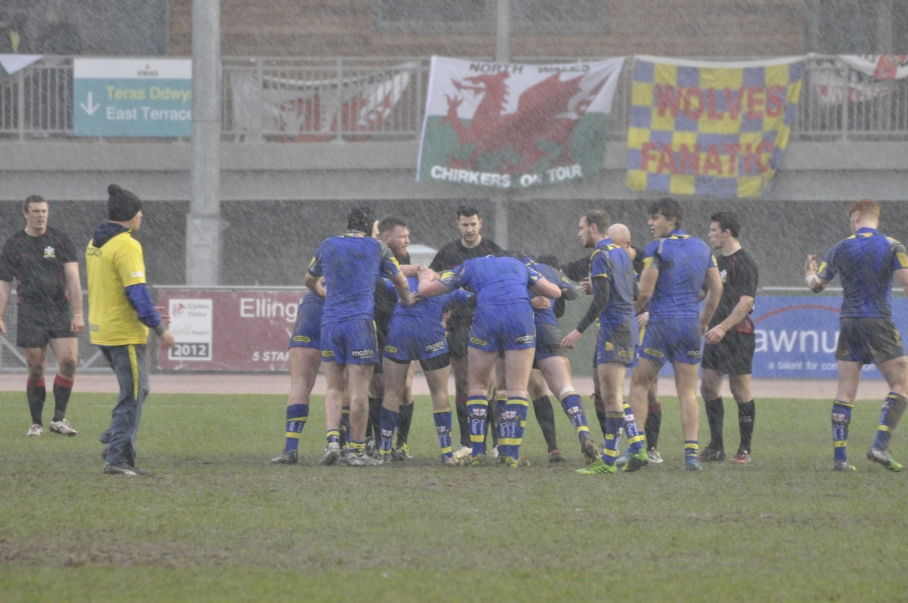
Crusaders and Warrington Wolves’ U19s pack down for a scrum in a recent pre-season friendly at Eirias Parc, Colwyn Bay.
For 2015 at least, the Welsh side find themselves back in the new-look League 1 – formerly Championship One – following their relegation from the Championship.
Along with Crusaders, four other clubs – Barrow Raiders, Keighley Cougars, Rochdale Hornets and Swinton Lions – were relegated last term, while Coventry Bears have also joined the semi-professional game, making League 1 a 14-team competition from this season onwards.
It all comes as part of #RLNewEra, as the RFL look to make all of their professional leagues more competitive with league restructuring.
In 2013, Crusaders’ second year of existence, the Wrexham-based outfit gained promotion from Championship One to the Championship, and although they recruited heavily to build a competitive, challenging squad that season, not many people could hide behind the fact that the success still came rather quickly in the club’s short history.
Last season in the Championship, Crusaders were tipped to do well by many but, unfortunately, that didn’t turn out to be the case. On paper, with the likes of Michael Platt, Mark Offerdahl, Stephen Wild and Craig Ashall signing up with the club, it looked as though Crusaders would have the experience to have a good shot at the Championship.
A shot at the Championship is exactly what Crusaders gave but, in the end, it was an effort that came well short. Indeed, if agonisingly narrow defeats at home to the likes of Doncaster, Dewsbury Rams, Workington Town and Halifax were turned into wins instead, it could have been very different and Crusaders could have had a chance of saving themselves from relegation. But it simply wasn’t to be.
Is it something to be disheartened about? Alright, it would have been nice for Crusaders to stay up and be competing at a higher level but, for me, it came a year, maybe two, too soon. However, one thing that it has been is a learning experience. I think that everyone at the club – off-field staff as well as on-field staff – will have learnt something from last season that will be valuable in the future.
After all, Crusaders go by the moto of #FearNothing – that won’t change. Sometimes, you have to take two steps backwards to take one forward.
Now, on to 2015 in League 1. To start, it certainly won’t be anything like the league that Crusaders won back in 2013. The only other team competing for the title alongside Crusaders that season was Oldham.
Next year, the four clubs relegated from the Championship with Crusaders will all be looking to compete at the top end. Then, you have York City Knights and Oldham, who will both be looking to challenge as they have done in the past, while the newly-named Newcastle Thunder, taken over by Newcastle Falcons and set to play their home games at Kingston Park in 2015, are continuing to improve year on year.
It is by no means going to be an easy season for Crusaders; head coach Anthony Murray has already spoke of how he expects it to be a tough, long season, and a challenge for his squad.
Personally, though, I think Crusaders are in a strong position heading into 2015.
Despite relegation, Crusaders showed at times last season that they could more than compete in the Championship. So, the fact that the North Walians have managed to keep the bulk of the 2014 squad together is a massive boost, although the loss of Toby Adamson, who was one of the club’s best performers last season, to Dewsbury Rams is a downside.
Equally as important as the retention of the majority of last year’s squad, however, is the additions. In particular, what the off-season recruits have brought to Crusaders’ squad is a blend of youth and experience, which is something that, in the past, hasn’t been there.
As well as signing Alex Davidson and Ryan Duffy on permanent contracts for 2015 following their loans last season, Callum Wright and Elliot Davies have also made their way to Crusaders. Nearly all of them have come through academy systems at Super League clubs, which can only be a good thing.
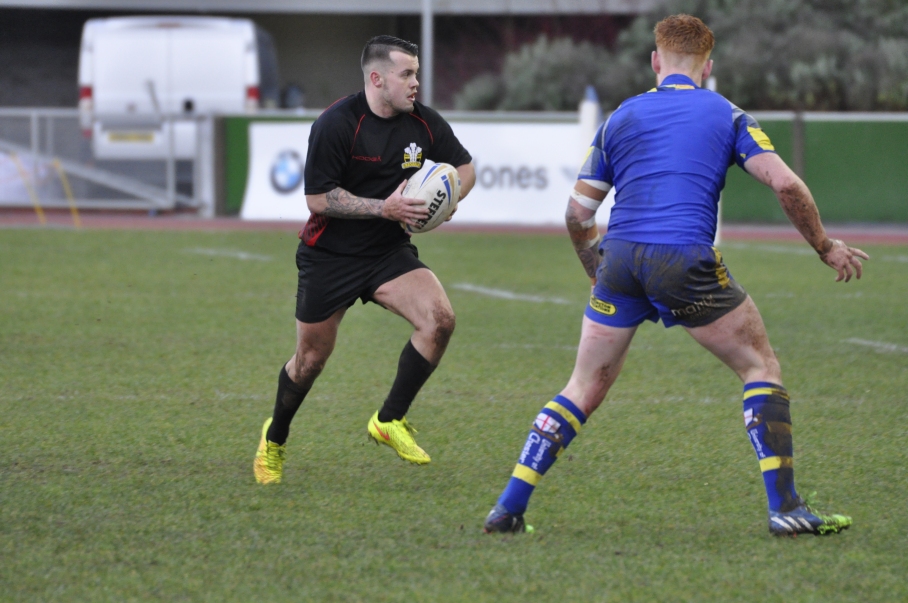
Crusaders’ off-season recruit Callum Wright, who has progressed through Wigan Warriors’ academy system, in action against Warrington Wolves U19s in pre-season.
And add to that the additions of Joe Burke, Mark Hobson, Ian Mort and Alex Thompson, who all have valuable experience at Championship level. Plus, Leon Brennan and Paddy Mooney have also joined the cause.
Thank God rugby league is back. It’s a new era for the sport and 2015 is set to be a fantastic year.
We are North Wales Crusaders. And we #FearNothing.
